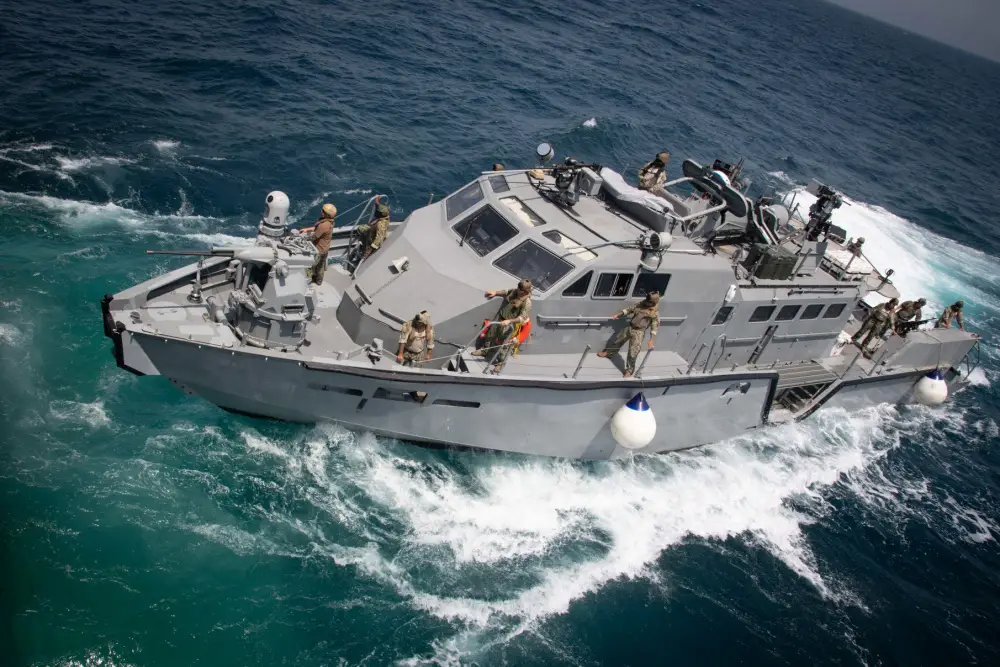The U.S. State Department has made a determination approving a possible Foreign Military Sale (FMS) to the Government of Ukraine of up to sixteen (16) Mark VI Patrol Boats and related equipment for an estimated cost of $600 million. The Defense Security Cooperation Agency delivered the required certification notifying Congress of this possible sale today. The prime contractor will be SAFE Boats International, Bremerton, WA. The proposed sale will improve Ukraine’s capability to meet current and future threats by providing a modern, fast, short-range vessel. Ukraine will utilize the vessels to better defend its territorial waters and protect other maritime interests.
The Government of Ukraine has requested to buy up to sixteen (16) Mark VI Patrol Boats; thirty-two (32) MSI Seahawk A2 gun systems; twenty (20) Electro-Optics-Infrared Radar (FLIR) (16 installed and 4 spares); sixteen (16) Long Range Acoustic Device (LRAD) 5km loudspeaker systems; sixteen (16) Identification Friend or Foe (IFF) systems; forty (40) MK44 cannons (32 installed and 8 spares); communication equipment; support equipment; spare and repair parts; tools and test equipment; technical data and publications; personnel training and training equipment; U.S. government and contractor engineering, technical, and logistics support services; and other related elements of logistics support. The estimated total cost is $600 million.

The Mark VI is a class of patrol boat in service with the United States Navy, designed by SAFE (Secure All-around Flotation Equipped) Boats International to patrol riverine and littoral waters. It represents a shift in Navy focus from Cold War-era blue water engagements to placing importance on brown water littoral zone operations. Designed to replace the legacy Riverine Command Boat for open water and near shore operations, the Mark VI is larger, more survivable, and better equipped with modernized weapons, communications, and intelligence, surveillance and reconnaissance systems.
The Mark VI is 84.8 ft (25.8 m) long, significantly longer than previous classes of Navy patrol boats. It has a crew of 10 sailors and can carry 8 additional personnel. The interior is spacious, with berthing for the crew and shock-absorbing seats for other occupants; the seats and sound deadening berthing spaces and galley allow the crew to operate in relatively high sea states while attenuating crew fatigue and risk of injury. The boats are fully networked with a command, control, communication and computing, surveillance and intelligence (C4SI) suite for enhanced situational awareness, survivability, and multi-mission support which includes flat screen monitors mounted throughout the ship.

Standard armament consists of two remote-controlled Mk 38 Mod 2 25 mm chain guns and six crewed M2 .50 caliber machine guns. Depending on mission needs, gun mounts can hold M240 machine guns, M134 miniguns, and Mk 19 grenade launchers. The Mark VI is equipped with the MK50 Gun Weapon System (GWS), a shipboard version of the vehicle-mounted M153 CROWS remote turret that enables crewmen to use its camera and gun from the operator’s station below deck. It is also planned to mount guided missiles such as the BGM-176B Griffin. Advanced lightweight armor plating is installed around key elements such as the crew compartment, engines and fuel tanks.
The aluminum-hulled Mark VI is powered by two MTU 16V2000M94 diesel engines connected to water jets that propel it faster than 35 kn (40 mph; 65 km/h), with a maximum range of 600 nmi (690 mi; 1,100 km). The reconfigurable main aft cabin can hold payloads such as Navy SEAL operators or a medical facility. The rear deck and stern is able to launch and recover small boats, unmanned aerial vehicles (UAVs), and unmanned undersea vehicles (UUVs). The cratf’s mast lowers to decrease overall height, allowing the craft to enter amphibious ship well decks. Mark VI can be transported and deployed by Navy amphibious ships such as landing helicopter docks, amphibious transport docks, and landing ship docks.
















